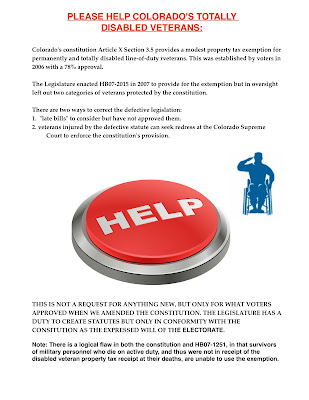
I learned more history about the senior and disabled veteran property tax exemption, based on some research conducted in the Capital Thursday morning. Kind folks in the Colorado Legislative Counsel's office provided a.
complete history of the evolution of HB07-1251, the statute which implemented
Article X Section 3.5 of the constitution, following approval by the electorate of
Referendum E. Our next step will be listening to the audio tapes of deliberations.
CLC's
Blue Book, the Legislature's "sales brochure" promoting the referendum, described the veterans to be covered by the referendum:
"Who qualifies for the tax reduction? Homeowners who have served on active duty in the U.S. Armed Forces and are rated 100-percent permanently disabled by the federal government due to a service-connected disability qualify for the tax reduction in Referendum E. Colorado National Guard members injured while serving in the U.S. Armed Forces also qualify. Veterans are rated 100-percent permanently disabled when a mental or physical injury makes it impossible for the average person to hold a job and the disability is lifelong.Nationally, less than one percent of veterans have a 100-percent permanent disability rating. About 2,200 veterans are expected to qualify for the property tax reduction in Colorado."
The first version of HB07-1251's description of qualified veteran was exactly as per Article X Section 3.5 of the constitution as it remains today:
(1.5) For purposes of this section, "disabled veteran" means an individual who has served on
active duty in the United States armed forces, including a member of the Colorado national guard
who has been ordered into the active military service of the United States, has been separated
therefrom under honorable conditions, and has established a service-connected disability that has
been rated by the federal department of veterans affairs as one hundred percent permanent
disability through disability retirement benefits or a pension pursuant to a law or regulation
administered by the department, the department of homeland security, or the department of the
army, navy, or air force.
The next version of HB07-1251 (
"Engrossed" version) made the changes in definition of qualified veteran. Those changes remained static thereafter until signed by the governor.
(3.5) "Qualifying disabled veteran" means an individual who has served on active duty in the United States armed forces, including a member of the Colorado National Guard who has been ordered into the active military service of the United States, has been separated therefrom under honorable conditions, and has established a service-connected disability that has been rated by the United States department of veterans affairs as one hundred percent permanent and total disability pursuant to a law or regulation administered by the department.
(Simply dropped from the final statute was the last phrase of the constitution., "through disability retirement benefits or a pension pursuant to a law or regulation administered by the department, the department of homeland security, or the department of the army, navy, or air force.")
CONCLUSION:
1. In its Blue Book for 2006, the Legislature obviously included, and the electorate approved, Colorado veterans whose disabilities were total, permanent, service-connected and that made veterans unemployable. In the actual wording for Referendum E, however, no specific mention was made of unemployable terms, and still the VA rating for unemployability complies with the referendum's specifics. CdmVA ends up refusing these totally disabled vets the exemption, opposite the people's goal.
2. The Legislature's first pass at legislation also had no reference to employability issues but did specify military permanent and total disability retirements as qualified for the property tax exemption. By the second version (Engrossed) military disability retirements were not mentioned, and that version of the definition was carried into the stature and into effect today.
3. Colorado Division of Veterans Affairs complies with the statute,
not the constitution, and denies property tax exemption to two groups of disabled veterans specified by the people when we amended the constitution to add the exemption to veterans. For some reason not apparent in the legislative history of HB07-1251,
"unemployability" went from acceptable to specifically refused by CDMVA. The constitutional provision recognizing military service disability ratings was cut from HB07-1251 in the Engrossed version, without comment...it just disappeared. CMDVA also excludes those veterans which obviously conflicts with the constitution.














